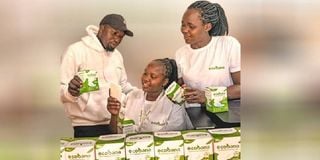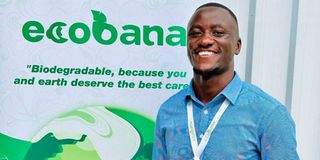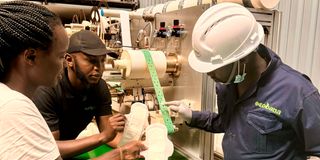Exploring the potential: Using banana stems for sustainable sanitary pads

EcoBana’s biodegradable sanitary pads are naturally soft, hypoallergenic, and absorbent. These pads are safe for sensitive skin and fully biodegradable, offering an eco-friendly alternative to conventional menstrual products.
The growing demand for sustainable alternatives to menstrual hygiene products is being driven by increasing concerns about the environmental impact of conventional pads, which are often made from plastic, synthetic materials and non-biodegradable components.
EcoBana has come up with an innovative solution: using banana stems and fibres to make biodegradable sanitary pads. This approach tackles period poverty while combating plastic pollution, making it an environmentally friendly alternative with significant social impact.
Founded in 2021, EcoBana is a social enterprise with a mission to tackle both menstrual issues and plastic pollution. Its founders – Lennox Omondi (CEO), Keylie Muthoni Ogola (COO), Brian Ndung'u (CMO) and Dulla Shiltone (CFO) – are leading this transformative movement by repurposing banana pseudo-stems, a resource that would otherwise go to waste.
The idea for EcoBana was born at St Paul's University, where the co-founders were students. Through their work, they aim to create jobs, reduce environmental waste and empower local communities while promoting sustainable practices.
“Our motivation grew after discovering that nearly one-third of female students in Kenya miss school due to a lack of access to sanitary products. This realisation sparked our commitment to addressing period poverty, a significant barrier to education and gender equality,” says Mr Omondi.
The urgency of the issue struck a chord with the young entrepreneurs. It was not just about providing sanitary products; it was about dignity, opportunity and basic human rights.
Period poverty
The idea for EcoBana was further solidified when the team visited a rural community to collect data on the impact of period poverty. As well as struggling with high rates of period poverty, this community was also home to Kenya's largest banana growing region.
“Recognising the potential to repurpose agricultural waste from banana farming, we began researching how banana fibres could be used to create sustainable sanitary pads. He says that this discovery marked the beginning of their journey to solve period poverty and environmental degradation,” he says.

Lennox Omondi, the CEO of EcoBana, a social enterprise that uses banana stems and fibres to produce biodegradable sanitary pads.
Over time, menstrual hygiene products have evolved to prioritise comfort, convenience and affordability. However, the large quantities of non-biodegradable waste generated by these products continue to pose significant environmental challenges.
In many regions, rising levels of menstrual poverty have led women, particularly in low- and middle-income communities, to seek reusable products as a more cost-effective and durable solution.
For these communities, access to sustainable and affordable menstrual hygiene options is essential, highlighting the growing need for alternatives that support healthy menstrual practices while reducing waste.
According to Mr Omondi, there is a clear need for EcoBana's products as the traditional sanitary pads currently on the market in Kenya and other African countries are not only expensive, but also harmful to the environment and women's health.
The initial capital for EcoBana was raised from the co-founders' savings, along with contributions from friends and family. This funding was used to develop the prototype and purchase essential equipment for early research.
Hult Prize Foundation
“As the business progressed, we received investment funding from the Swiss Embassy in Nairobi, amounting to Sh900,000, which allowed us to purchase our first set of machines. Later, we secured $1 million from the Hult Prize Foundation, followed by a recent investment of Sh1.65 million from Total Energies,” he says.
He adds that this investment came at a crucial stage in their growth, enabling the company to scale up operations, build a manufacturing facility, upgrade machinery to produce 200 pads per minute and create jobs for 24 full-time staff, 14 volunteers and 7 part-time staff.
Like any entrepreneurial venture, EcoBana has faced its share of challenges, particularly in the early stages. One of the main obstacles was the lack of access to machinery capable of producing sanitary pads.
“As students, we did not have the capital or resources to buy the necessary equipment to create a prototype. However, we were resourceful and visited the Kenya Industrial Research and Development Institute (KIRDI), where we used the available machinery to create a proof of concept. This allowed us to validate our idea and refine our production process,” he says.
The breakthrough came when the team discovered the high absorption rate of banana fibre due to its natural mycelium content.

Employees of EcoBana sorting and packing the biodegradable sanitary pads.
This discovery, combined with the growing global demand for sustainable products, positioned EcoBana as a leader in the green movement.
The production process begins with the sourcing of banana pseudo-stems from local farms, where the fibres are extracted and processed into pulp. This pulp is then used to create fully biodegradable sanitary pads designed to be both comfortable and effective.
The entire process is carefully monitored by a skilled team of three engineers, ensuring that the pads are produced with minimal environmental impact, unlike conventional plastic-based alternatives.
“Our operations have positively impacted local communities, especially small-scale farmers in Kisii County, where we source the pseudo stems. To date, we have supported over 500 farmers, boosting local economies and promoting sustainable farming practices,” he says.
New revenue stream
By repurposing what was once considered waste, EcoBana is creating a valuable new revenue stream and contributing to the development of a circular economy.
EcoBana’s biodegradable sanitary pads are naturally soft, hypoallergenic, and highly absorbent. Designed for optimal comfort and durability, the pads are safe for sensitive skin and fully biodegradable, offering an eco-friendly alternative to conventional menstrual products.
The pads are rigorously tested to ensure high absorbency and leak-proof reliability throughout use. With no plastic, fragrance, or harmful chemicals, they offer a safer, eco-friendly alternative to traditional menstrual products.
Currently available in ultra-thin sizes retailing at Sh90, EcoBana is working to expand its product range to include other sizes. In addition, the pads are 100 percent compostable, helping to reduce the environmental impact of menstrual hygiene products.
“Our fully automated manufacturing system in Kisii ensures precision and consistency, minimising human error through advanced sensors and monitoring systems that track critical parameters such as pressure, temperature, and material alignment,” he notes.
In addition to its sustainable production practices, EcoBana uses a strategic B2B distribution model to reach underserved communities. They partner with NGOs, schools and community-based organisations (CBOs) that focus on improving menstrual hygiene and empowering women.
EcoBana also works with corporate organisations on CSR initiatives, providing eco-friendly menstrual products for community programmes.
It also aims to expand its reach through digital platforms and awareness campaigns, using social media, educational workshops and influencer partnerships to raise awareness about menstrual health and sustainability.
EcoBana plans to launch new product lines, including biodegradable diapers, with the goal of making environmentally friendly sanitary products accessible to underserved communities across Africa.
The company aims to become a global leader in sustainable hygiene solutions by expanding into growing international markets in Asia and Latin America, while empowering women through affordable, biodegradable sanitary products that help reduce absenteeism in schools and workplaces.
mwmaina@ke.nationmedia.com


